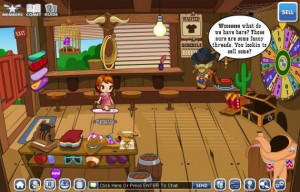Fantage儿童虚拟世界网站用户数量呈翻倍增长
由于世界金融危机,儿童虚拟世界受其影响呈现发展不稳定。在纷繁多样的虚拟世界中一家网站引起了业内人士的关注,Fantage是一款面向热爱游戏和表演时尚的儿童虚拟世界,该款游戏在过去的一年中用户呈翻倍增长。
与一年前150万用户相比,这家位于新泽西州利堡的游戏公司现在每月拥有330万登录用户。迄今累计有770万多注册用户,比一年前的300万增长了一倍有余。这一增长速度即便在儿童游戏类发展的巅峰时期也是无可比拟的。
这个Flash网站的创立者David Hwang和Peter Bae认为,Fantage网站玩家的增长主要归功于他们长期以来对网站的不断完善。今年夏天,他们还在游戏中新增了虚拟宠物和用于购买游戏道具的虚拟货币,孵化宠物的宠物蛋一共可以孵化出25种不同种类的宠物。
Fantage网站的主要竞争对手包括迪士尼的《企鹅俱乐部》,对此Hwang在访问中表示迪士尼曾经是Fantage的几百倍大,但同时Fantage的发展十分迅速,不容小觑。他认为社交网站这种动态市场可以为小型公司提供一线机会。
虚拟世界网站市场纷繁复杂,各公司之间竞相角逐,如Moshi Monsters, Dizzywood, Neopets, SuperSecret, Free Realms, Gala.net, Gaia Online和Dinokids.
Fantage网站备受欢迎的一个主要原因就是无需下载(最近,儿童游戏网站Smith & Tinker发展孩子不被允许在父母的电脑进行下载是阻碍其WAU上升的重要因素)。然而,这也意味着Fantage网站的游戏图样简单以确游戏占用空间小。目前Fantage网站的各种迷你游戏无需付费,用户仅需每月支付5.99美元就可以包月。Fantage以6至15岁的儿童为主要目标客户群。
与许多网站相同,Fantage网站用户可以装扮自己的虚拟头像或角色:更换发行,服装、肤色、眼镜和配饰等。用户还可以为自己的虚拟家园收集各种装饰品,购买家具。孩子们可以玩各种迷你游戏,赚取虚拟货币,还可以和朋友们聊天。另外游戏中还有时装表演、时尚聚会等各种游戏事件。
现在Bae与其合作伙伴Hwang计划领导这家拥有34个员工的公司进军韩国网络网络游戏市场。基于Fantage本身的市场经验,Bae与Hwang深知耐心和实验在开发游戏过程中的重要性。2007年1月Bae和Hwang创建这家公司,这是Hwang的第三家公司,Bae的第二家。他们聘用了几名程序员,决心建立一个网络教育网站。
首先,他们尝试着建立了一个并不为人所知的数学网站。之后,他们决定开发一个内置儿童虚拟游戏虚拟世界。几个月后,他们向目标儿童群展现这一成果时并不受好评,Bae和Hwang决定放弃该计划。再后来,他们创立了Fantage(全称为Fantastic Age),这是一款以迪士尼《企鹅俱乐部》为原型的奇幻世界。
在这个网络虚拟世界中,孩子们可以创立装扮自己的卡通形象,与朋友们一起聊天,玩游戏。游戏风格是日本可爱动画风融合了一些美国特色,游戏中的卡通角色以娇小的身躯顶着大大的脑袋、镶着水汪汪的大眼睛,可以做出眨眼、挥手和哭泣3种不同的动作。
2008年4月,Bae和Hwang发布了Fantage的试用网站。该网站基于Adobe Flash技术,无需下载。在游戏中,他们开发了各种服饰以供孩子们选择。
那年5月,Fantage网站的用户就有3到4万人,其中70%是女孩子。此后,他们更开始实行每月5.99美元的会员制。考虑到大部分父母不喜欢向孩子们兜售各种商品的广告商,Fantage网站中不设任何广告。
之后,Fantaga与韩国知名网络游戏发行商Nexon结成策略合作伙伴。Nexon同意向Fantage公司进行少量投资,并成为该网站在欧洲和日本市场的发行商。今年底,Fantage公司计划突破注册用户的1000万。
Virtual worlds for kids have been volatile during the recession. Some have come and gone. Some have declined. So it’s worth noting that Fantage, a virtual world for kids who like playing games and staging fashion shows, has doubled its audience in the past year.
The Fort Lee, N.J.-based company now has 3.3 million unique visitors a month, compared to 1.5 million nearly a year ago. To date, it has had 7.7 million registered users, compared to 3 million a year ago. That’s pretty good growth at a time when the competition for the attention of kids is growing.
David Hwang and Peter Bae, founders of the Flash-based site, say the growth has come because they have been constantly refining the site, adding virtual pets this summer as well as a virtual currency so that users can buy virtual items. The virtual pets start out as eggs that can hatch into 25 kinds of pets, which you then use to play games.
Fantage competes against such sites as Disney’s Club Penguin. “Disney used to be a hundred times bigger than us, but we’re growing faster,” Hwang said in an interview. “This is a dynamic market, where small players have a chance.”
For sure, the market is crowded. Rivals abound, such as Moshi Monsters, Dizzywood, Neopets, SuperSecret, Free Realms, Gala.net, Gaia Online, and Dinokids.
The Fantage site is accessible because it doesn’t require users to download anything. (Kid-focused game site Smith & Tinker recently found out the hard way that kids in particular are not allowed to download programs onto their parents computers.) That means, however, that Fantage has to keep its graphics fairly simple. The site is free-to-play, and users can buy a monthly subscription for $5.99. The site targets users ages six to 14.
As with many sites, you can customize your avatar, or virtual character, by changing its hair, clothes, skin tone, eyes, accessories and hover boards. Users can also collect goods for their homes and customize their furniture. Kids can play a variety of mini games, where they can earn more virtual currency. And they can chat with friends in a safe environment. They can stage events such as fashion shows or parties.
The company has 34 employees. Bae and co-founder Hwang were steeped in Korean online games. From their experience in that market, they learned the virtue of patience and experimentation. They started their company in January, 2007. This was Hwang’s third startup and Bae’s second. They hired some contract programmers and decided to build a site focused on online education.
First, they tried an online math web site. It went nowhere. Next, they decided to build a virtual world with built-in games for young kids. After a few months, they showed it to a focus groups of kids, who hated it. Bae and Hwang tossed it all out. Then they created what would become Fantage, (short for Fantastic Age) a fantasy world modeled after Disney’s Club Penguin.
As a web-connected virtual world, Fantage is a place where kids can create cartoon-like avatars and dress them up, chat with friends, and play simple games. The art is based on cute Japanese anime style, but with distinctly American twists. The characters have big heads, big eyes, and small bodies. They can make three gestures: wink, wave, and cry. And they can glide around on an air board. It’s a lot like the imagery in Gaia Online.
They launched the free beta site in April, 2008. The site was built on Adobe Flash, with no download required. They created all sorts of clothing and accessories for the kids to choose from. By May, the site had grown to 30,000 – 40,000 users, about 70 percent of whom are girls. They started a premium membership that cost $5.99 a month. There are no ads, since parents don’t like advertisers selling stuff to their children.
They signed up Nexon, the South Korean online game publisher that has made huge hits such as Maplestory, as a strategic partner. Nexon made a minority investment in Fantage and signed the rights to become the publisher of the site in Europe and Japan. The company’s goal is to hit 10 million registered users by the end of this year.(Source:VentureBeat)









































 闽公网安备35020302001549号
闽公网安备35020302001549号